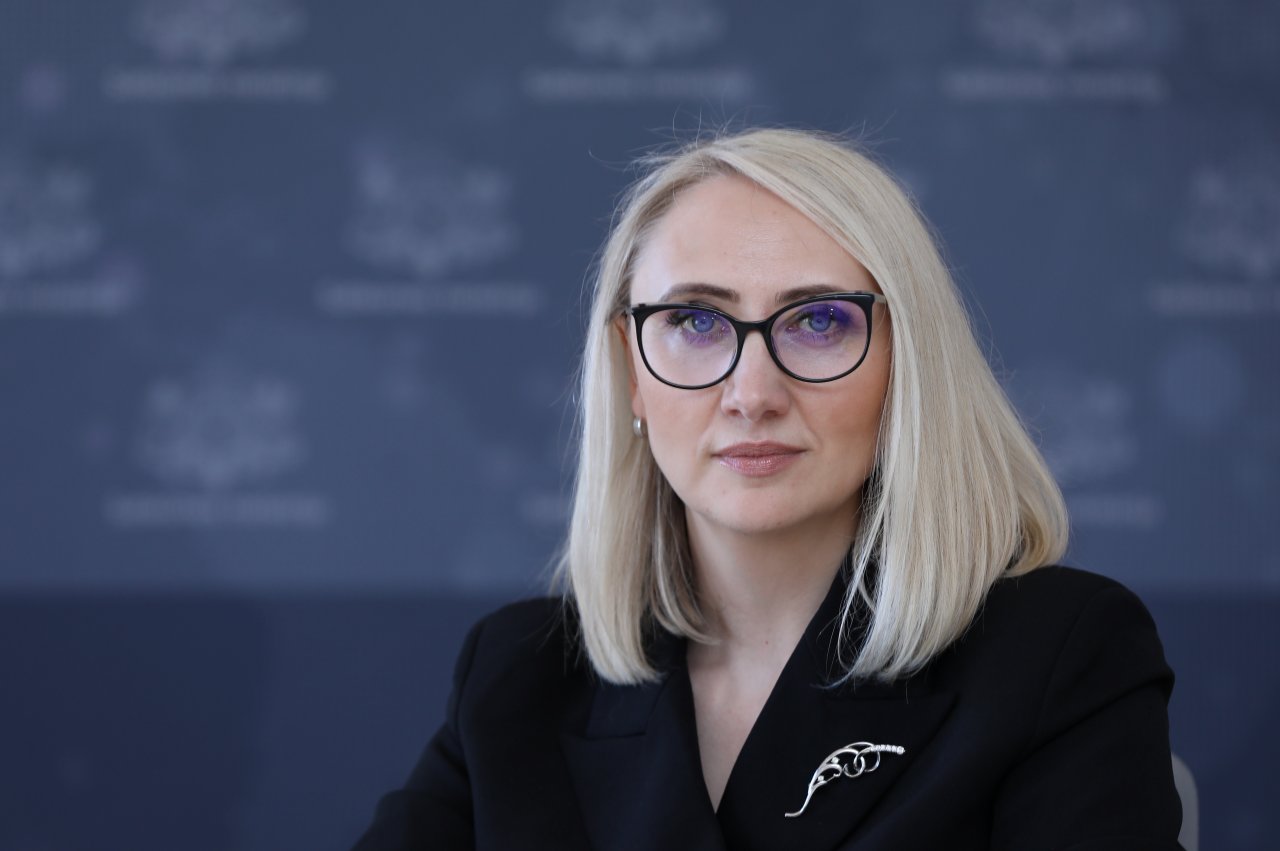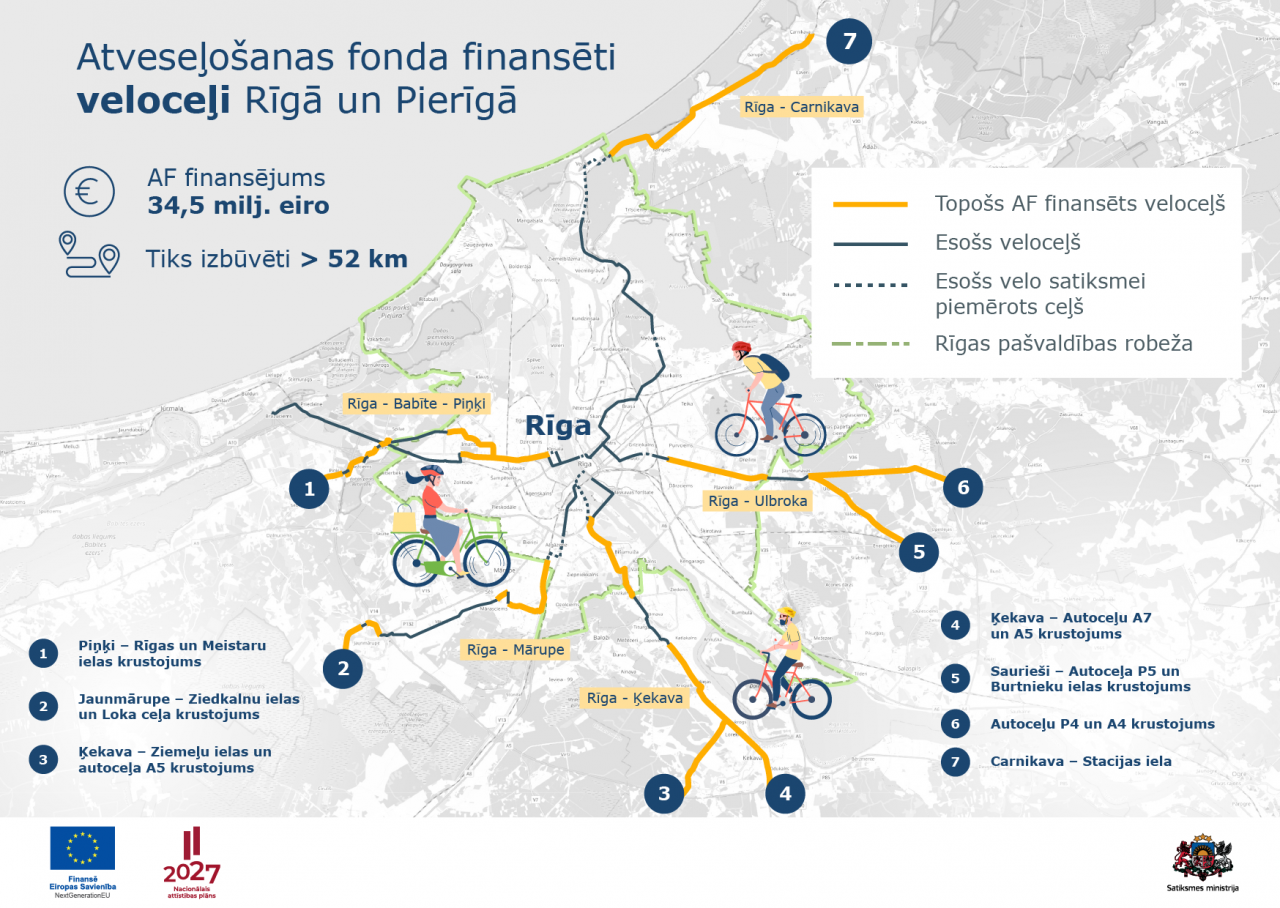Ligita Austrupe, Deputy State Secretary, Ministry of Transport
We live in an era of transformation - not only the environment around us, but also our thinking, attitude and habits change. Changes in the transport sector are a long-term process, and everyone experiences them to a greater or lesser extent, because our daily life is unimaginable without mobility. At the same time, the implementation of these changes is a complex process - every cog counts - any project or activity must be integrated into a common sectoral development plan.
Changes in the transport sector transform our daily travel habits and they will change over the next few years, which is due to our desire to live greener and more environmentally friendly. Who would deny that we all want to live in a cleaner environment? In order to live better tomorrow, decisions, often tough ones, are to be taken today. The world has developed depending on fossil fuels, therefore shifting to renewable energy over the next ten years will be difficult both psychologically and financially. The regulatory framework of the European Union (EU) does not allow Latvia to withdraw or postpone this decision-making.
During the programming period of the EU funds for the years 2021-2027, more than €900 million is available for the development of industry sectors under the supervision of the Ministry of Transport (MOT). Majority of €870 million is dedicated to the transport sector and this will enable gradual approach to our objectives: sustainable and smart mobility development, completely abandoning fossil fuels and ensuring road integration within the trans-European transport network (TEN-T). More than €30 million has been allocated to the development of the communications sector. This investment will help us to get closer to the target: development of smarter technologies in transport sector and digitalisation in general.
Development of a sustainable TEN-T infrastructure is one of the investment directions in the transport sector. Since 2004 it has been governed and developed with the support of EU funding. The European Commission has assessed Latvia’s performance as sufficient regarding the integration of roads into the trans-European transport network. At the same time, there are separate sections of roads the construction of which need to be completed in order to comply with EU regulatory framework by 2030. Is the quality of the existing road network in line with the European quality requirements? No, that is why investments will be directed to the construction of new sections and the adaptation of the existing roads to meet modern technical requirements. A high-quality and modern connection between the state cities and the trans-European transport network will contribute to regional economic development and strengthen national competitiveness. Also, diverting truck traffic outside the urban centres will improve the quality of the urban environment.
The construction of a modern four-lane Riga bypass that meets the EC requirements is the most ambitious project of this planning period. It is expected that it will bring about significant changes in the daily lives of many people. The beneficiaries will be both the residents of Riga and the drivers who are stuck in traffic jams in order to pass through Riga. The diversion of traffic, including cargo flow around Riga, will provide for decrease of emissions and noise level in the city.
With the support of EU funds in the previous programming period, an electric vehicle charging network has already been established in Latvia, ensuring the charging and mobility of electric vehicles throughout the country. In turn, during this programming period, the development of a high-capacity electrical transport charging network is planned to ensure the charging of trucks along the TEN-T network.
Sustainable and smart mobility is an opportunity to move safely, environmentally friendly and comfortably every day. The most important measure and a step closer to the EU Green Deal is the strengthening of the rail as the backbone of public transport, gradually replacing the rolling stock of the old passenger trains. With the EU funding for the 2014-2020 programming period, we are buying 23 new electric trains, and we will enjoy the first electric trains already at the end of this summer. With the support of the EU funds and the Recovery and Resilience Facility (RRF), a gradual replacement of old diesel trains for modern emission-free electric trains (BEMU) is planned, which will also ensure transportation of passengers on non-electrified sections of the railway line. Unfortunately, we do not have the opportunity to replace immediately all old passenger trains, but by 2026, a large part of the diesel trains powered by fossil fuels will be replaced. This will enable citizens to enjoy comfortable journay on a daily basis and at the same time will contribute to the achievement of the European Green Deal. I hope that the upcoming changes and amenities in rail traffic will help to change our travel habits and that more and more citizens who travel with their private cars will make their choice in favour of the train.
The main prerequisite for enabling today's environmentally - friendly trains to run is the adaptation and modernisation of existing railway infrastructure, which is intended to be implemented under the RRF and EU funding. Improvements in rail infrastructure, adapted to today's safety and speed requirements, are planned with the support of EU funds. Meanwhile, RRF investments will be implemented to modernise public transport infrastructure in Riga and the surrounding region Pieriga. These changes are scheduled to be implemented by 2026, and the main beneficiaries will be residents of Pieriga, who travel daily to Riga for work, training or other purposes.
For the mobility of citizens, investments and development of rail is planned in synergy with the roads. In order to ensure convenient and integrated connections between different modes of transport, enabling citizens to switch from private to public transport, the investment of EU funds is intended to create multi-modal public transport hubs or mobility points – both in Riga and in Pieriga, as well as other regional transport points in Latvia.
Looking a little further into the future, we will evaluate the possibilities for the construction of Rail Baltica regional railway stations within the funding framework of the planning period. Planning of the railway stations should take into account simultaneity of the actions related to availability and functionality of the stations as well as rail infrastructure development and start of operation. Therefore, there is a need for a common timeframe and plan, based on the railway line deployment.
The ever-increasing popularity of various micro-mobility tools is also changing our daily mobility habits. Unfortunately, the existing infrastructure does not support safe micro-mobility, so change is needed in this area as well. In order to promote micro-mobility, the development of bicycle infrastructure is planned, attracting both EU funds and RRF investments for this purpose. Also, when planning mobility points, infrastructure supporting bicycles and other micro-mobility tools will be provided, so that citizens could conveniently switch to public transport. We travel short distances on foot or by bicycle, longer ones by environmentally friendly public transport - this could be our daily mobility formula in the near future.
Development in electronic communications: high performance infrastructure and data transmission speed are prerequisites for implementation of digitisation in the transport sector. During the new programming period, we will carry out pilot projects for the development of intelligent urban transport systems. In the future, they could be extended to meet public needs and infrastructure development plans by attracting other financial sources.
Investment for further development of the broadband network is intended. The goal of EU fund investment over the coming years is to expand the middle-mile network in areas where Internet availability is still not at a sufficiently good level. The construction of 5G infrastructure is also planned, along the TEN-T network's land transport routes including, which are prerequisites for the use of new technologies in transport and any other field.
The middle mile without the last mile is pointless, so in the coming years we are also planning the development of the last mile in line with the market trends and operators' offers. To ensure the availability of high-speed Internet in areas where the interest of operators is not high, we are developing a state support program for investments of the last mile development. There is no doubt that fast internet throughout the country is vitally necessary for further development of the regions and the strengthening of the country's competitiveness,
Digital development requires and will require increasing investment in cyber protection, and it is everyone’s responsibility to protect oneself and its own data - this will contribute to achieve this goal. It is planned to establish a single cyber security solution for national authorities: providing a single shared information and communication technology infrastructure that will provide an equally high level of security, both for resources in the national data centres and state institutions, as well as their users, according to the situation in cyberspace.
Taking into account the geopolitical and national economic situation of the region, our plans for the development of the transport and communications sectors are challenging,. At the same time, we are aware that in order to get closer to the European average level, our development should not stop. Nor can we stop our commitment to get closer to the EU Green Deal either. We want to live in a cleaner environment and enjoy the same amenities as other European countries during our daily journeys.
De iure Latvia has been a member of the EU for 19 years. The changes we are implementing in the transport and communications sectors bring us closer to Europe de facto.


